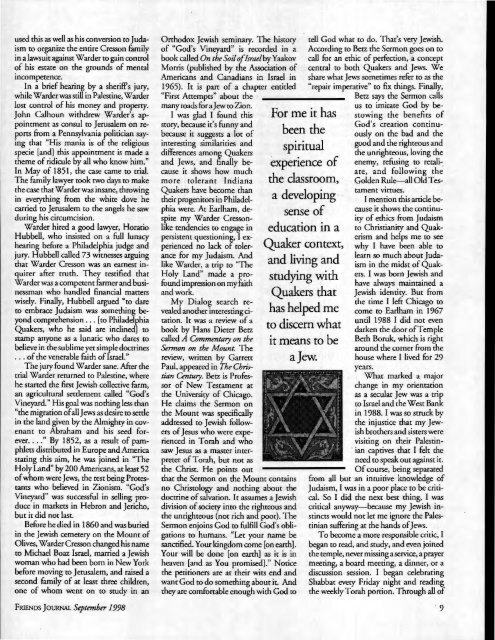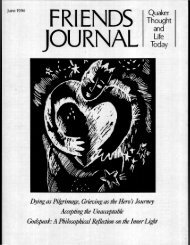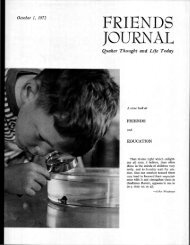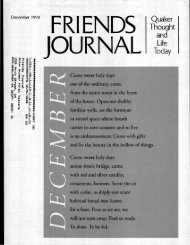Quaker Thought and Today - Friends Journal
Quaker Thought and Today - Friends Journal
Quaker Thought and Today - Friends Journal
You also want an ePaper? Increase the reach of your titles
YUMPU automatically turns print PDFs into web optimized ePapers that Google loves.
used this as wdl as his conversion to J uclaism<br />
to organize the entire Cresson family<br />
in a lawsuit against Warder to gain control<br />
of his estate on the grounds of mental<br />
incompetence.<br />
In a brief hearing by a sheriffs jury,<br />
while Warder was still in Palestine, Warder<br />
lost control of his money <strong>and</strong> property.<br />
John Calhoun withdrew Warder's appointment<br />
as consul to Jerusalem on reportS<br />
from a Pennsylvania politician saying<br />
that "His mania is of the religious<br />
specie [<strong>and</strong>] this appointment is made a<br />
theme of ridicule by all who know him."<br />
In May of 1851, the case carne to trial.<br />
The family lawyer took two days to make<br />
the case that Warder was insane, throwing<br />
in everything from the white dove he<br />
carried to Jerusalem to the angels he saw<br />
during his circumcision.<br />
Warder hired a good lawyer, Horatio<br />
Hubbell, who insisted on a full lunacy<br />
hearing before a Philadelphia judge <strong>and</strong><br />
jury. Hubbell called 73 witnesses arguing<br />
that Warder Cresson was an earnest inquirer<br />
after truth. They testified that<br />
Warder was a competent farmer <strong>and</strong> businessman<br />
who h<strong>and</strong>led financial matters<br />
wisely. Finally, Hubbell argued "to dare<br />
to embrace Judaism was something beyond<br />
comprehension . . . [to Philadelphia<br />
<strong>Quaker</strong>s, who he said are inclined] to<br />
stamp anyone as a lunatic who dares to<br />
believe in the sublime yet simple doctrines<br />
... of the venerable faith oflsrad."<br />
The jury found Warder sane. After the<br />
trial Warder returned to Palestine, where<br />
he started the first Jewish collective farm,<br />
an agricultural settlement called "God's<br />
Vineyard." His goal was nothing less than<br />
"the migration of all Jews as desire to settle<br />
in the l<strong>and</strong> given by the Almighty in covenant<br />
to Abraham <strong>and</strong> his seed forever<br />
.... " By 1852, as a result of pamphlets<br />
distributed in Europe <strong>and</strong> America<br />
stating this aim, he was joined in "The<br />
Holy L<strong>and</strong>" by 200 Americans, at least 52<br />
of whom were Jews, the rest being Protestants<br />
who believed in Zionism. "God's<br />
Vineyard" was successful in selling produce<br />
in markets in Hebron <strong>and</strong> Jericho,<br />
but it did not last.<br />
Before he died in 1860 <strong>and</strong> was buried<br />
in the Jewish cemetery on the Mount of<br />
Olives, Warder Cresson changed his name<br />
to Michael Boaz lsrad, married a Jewish<br />
woman who had been born in New York<br />
before moving to Jerusalem, <strong>and</strong> raised a<br />
second family of at least three children,<br />
one of whom went on to study in an<br />
FRIENDS j OURNAL September 1998<br />
Orthodox Jewish seminary. The history<br />
of "God's Vineyard" is recorded in a<br />
book called On the Soil o(Israelby Yaakov<br />
Morris (published by the Association of<br />
Americans <strong>and</strong> Canadians in Israel in<br />
1965). It is part of a chapter entitled<br />
"First Attempts" about the<br />
many roads for a Jew to Zion.<br />
I was glad I found this<br />
story, because it's funny <strong>and</strong><br />
because it suggests a lot of<br />
interesting similarities <strong>and</strong><br />
differences among <strong>Quaker</strong>s<br />
<strong>and</strong> Jews, <strong>and</strong> finally because<br />
it shows how much<br />
more tolerant Indiana<br />
<strong>Quaker</strong>s have become than<br />
their progenitors in Philadelphia<br />
were. At Earlham, despite<br />
my Warder Cressonlike<br />
tendencies to engage in<br />
persistent questioning, I experienced<br />
no lack of tolerance<br />
for my Judaism. And<br />
like Warder, a trip to "The<br />
Holy L<strong>and</strong>" made a profound<br />
impression on my faith<br />
<strong>and</strong> work.<br />
My Dialog search revealed<br />
another interesting citation.<br />
It was a review of a<br />
book by Hans Dieter Betz<br />
called A Commentary on the<br />
Sermon on the Mount. The<br />
review, written by Garrett<br />
Paul, appeared in The Christian<br />
Century. Betz is Professor<br />
of New Testament at<br />
the University of Chicago.<br />
He claims the Sermon on<br />
the Mount was specifically<br />
addressed to Jewish followers<br />
of Jesus who were experienced<br />
in Torah <strong>and</strong> who<br />
saw Jesus as a master interpreter<br />
ofT orah, but not as<br />
the Christ. He points out<br />
that the Sermon on the Mount contains<br />
no Christology <strong>and</strong> nothing about the<br />
doctrine of salvation. It assumes a Jewish<br />
division of society into the righteous <strong>and</strong><br />
the unrighteous (not rich <strong>and</strong> poor). The<br />
Sermon enjoins God to fulfill God's obligations<br />
to humans. "Let your name be<br />
sanctified. Your kingdom come [on earth].<br />
Your will be done [on earth] as it is in<br />
heaven [<strong>and</strong> as You promised]." Notice<br />
the petitioners are at their wits end <strong>and</strong><br />
want God to do something about it. And<br />
they are comfortable enough with God to<br />
For me it has<br />
been the<br />
spiritual<br />
experience of<br />
the classroom,<br />
a developing<br />
sense of<br />
education in a<br />
<strong>Quaker</strong> context,<br />
<strong>and</strong> living <strong>and</strong><br />
studying with<br />
<strong>Quaker</strong>s that<br />
has helped me<br />
to discern what<br />
it means to be<br />
a Jew.<br />
tell God what to do. That's very Jewish.<br />
According to Betz the Sermon goes on to<br />
call for an ethic of perfection, a concept<br />
central to both <strong>Quaker</strong>s <strong>and</strong> Jews. We<br />
share what Jews sometimes refer to as the<br />
"repair imperative" to fix things. Finally,<br />
Betz says the Sermon calls<br />
us to imitate God by bestowing<br />
the benefits of<br />
God's creation continuously<br />
on the bad <strong>and</strong> the<br />
good <strong>and</strong> the righteous <strong>and</strong><br />
the unrighteous, loving the<br />
enemy, refusing to retaliate,<br />
<strong>and</strong> following the<br />
Golden Rule-all Old T es<br />
tament vinues.<br />
I mention this article because<br />
it shows the continuity<br />
of ethics from Judaism<br />
to Christianity <strong>and</strong> <strong>Quaker</strong>ism<br />
<strong>and</strong> helps me to see<br />
why I have been able to<br />
learn so much about Judaism<br />
in the midst of <strong>Quaker</strong>s.<br />
I was born Jewish <strong>and</strong><br />
have always maintained a<br />
Jewish identity. But from<br />
the time I left Chicago to<br />
come to Earlham in 1967<br />
until 1988 I did not even<br />
darken the door ofT emple<br />
Beth Boruk, which is right<br />
around the corner from the<br />
house where I lived for 29<br />
years.<br />
What marked a major<br />
change in my orientation<br />
as a secular Jew was a trip<br />
to Israel <strong>and</strong> theW est Bank<br />
in 1988. I was so struck by<br />
the injustice that my Jewish<br />
brothers <strong>and</strong> sisters were<br />
visiting on their Palestin-<br />
. ian captives that I felt the<br />
need to speak out against it.<br />
Of course, being separated<br />
from all but an intuitive knowledge of<br />
Judaism, I was in a poor place to be critical.<br />
So I did the next best thing, I was<br />
critical anyway-because my Jewish instincts<br />
would not let me ignore the Palestinian<br />
suffering at the h<strong>and</strong>s of}ews.<br />
To become a more responsible critic, I<br />
began to read, <strong>and</strong> study, <strong>and</strong> even joined<br />
the temple, never missing a service, a prayer<br />
meeting, a board meeting, a dinner, or a<br />
discussion session. I began celebrating<br />
Shabbat every Friday night <strong>and</strong> reading<br />
the weekly Torah ponion. Through all of






